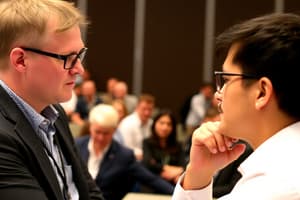Podcast
Questions and Answers
What is the primary role of Wernicke's area in the brain?
What is the primary role of Wernicke's area in the brain?
- To regulate motor functions
- To facilitate speech production
- To decode speech (correct)
- To improve verbal memory
Who is the neurologist after whom Wernicke's area is named?
Who is the neurologist after whom Wernicke's area is named?
- Walter Cannon
- Pierre Paul Broca
- Carl Wernicke (correct)
- Sigmund Freud
What aspect of language is primarily associated with Broca's area?
What aspect of language is primarily associated with Broca's area?
- Non-verbal communication
- Speech production (correct)
- Decoding written language
- Understanding language context
According to Ardila, what is an additional aspect of Broca's area beyond language?
According to Ardila, what is an additional aspect of Broca's area beyond language?
Which of the following deficits is associated with damage to Broca's area?
Which of the following deficits is associated with damage to Broca's area?
What is one primary focus of psychologists in the realm of language?
What is one primary focus of psychologists in the realm of language?
Which hemisphere of the brain is primarily responsible for language and logical analysis?
Which hemisphere of the brain is primarily responsible for language and logical analysis?
What aspect of human behavior do psychologists contribute to public debate?
What aspect of human behavior do psychologists contribute to public debate?
Which process is NOT one of the primary interests in psycholinguistics?
Which process is NOT one of the primary interests in psycholinguistics?
What common trend is observed among young people's use of language?
What common trend is observed among young people's use of language?
What is a function attributed to the right hemisphere of the brain?
What is a function attributed to the right hemisphere of the brain?
In the context of psychology, what do findings often provoke in society?
In the context of psychology, what do findings often provoke in society?
What distinguishes the focus of psychology from language as a social phenomenon?
What distinguishes the focus of psychology from language as a social phenomenon?
What is the most accurate definition of psychology today?
What is the most accurate definition of psychology today?
Who founded the world's first laboratory of experimental psychology?
Who founded the world's first laboratory of experimental psychology?
Which idea was central to both Pavlov's work and the development of behaviorism?
Which idea was central to both Pavlov's work and the development of behaviorism?
What was Freud's primary focus in his psychoanalytic theory?
What was Freud's primary focus in his psychoanalytic theory?
Which psychological movement emerged in the mid-20th century as a response to behaviorism and psychoanalysis?
Which psychological movement emerged in the mid-20th century as a response to behaviorism and psychoanalysis?
What concept did Gestalt psychologists focus on in their research?
What concept did Gestalt psychologists focus on in their research?
Which therapy model grew out of cognitive psychology as an alternative to psychoanalysis?
Which therapy model grew out of cognitive psychology as an alternative to psychoanalysis?
What was one of the significant ideas proposed by Freud's theories?
What was one of the significant ideas proposed by Freud's theories?
Flashcards
Psychology definition
Psychology definition
The scientific study of the mind and behavior.
Wilhelm Wundt
Wilhelm Wundt
Established the first psychology lab (1879), making psychology a science.
Ivan Pavlov
Ivan Pavlov
Studied animal conditioning, influencing behaviorism.
Behaviorism
Behaviorism
Signup and view all the flashcards
John Watson
John Watson
Signup and view all the flashcards
Sigmund Freud
Sigmund Freud
Signup and view all the flashcards
Psychoanalysis
Psychoanalysis
Signup and view all the flashcards
Cognitive psychology
Cognitive psychology
Signup and view all the flashcards
Psycholinguistics
Psycholinguistics
Signup and view all the flashcards
Right brain hemisphere
Right brain hemisphere
Signup and view all the flashcards
Left brain hemisphere
Left brain hemisphere
Signup and view all the flashcards
Broca's area
Broca's area
Signup and view all the flashcards
Wernicke's area
Wernicke's area
Signup and view all the flashcards
Language centers
Language centers
Signup and view all the flashcards
Psychology's impact
Psychology's impact
Signup and view all the flashcards
Cognitive Therapy
Cognitive Therapy
Signup and view all the flashcards
Cognitive-Behavioral Therapy
Cognitive-Behavioral Therapy
Signup and view all the flashcards
Humanistic Psychology
Humanistic Psychology
Signup and view all the flashcards
Language
Language
Signup and view all the flashcards
Study Notes
Psychology Definition
- Psychology is the scientific study of the mind and behavior.
History of Psychology
- Wilhelm Wundt established the first experimental psychology lab in 1879, marking psychology as a scientific subject.
- Ivan Pavlov's experiments on animal conditioning in the 1890s influenced the development of behaviorism, a psychological movement focusing on observable behaviors.
- John Watson popularized the “stimulus–response” theory through his work.
- Sigmund Freud, a Viennese neurologist, developed a theory of mind based on patient observations, emphasizing the unconscious mind's role in behavior, which led to the development of psychoanalysis.
- The mid-20th century saw a shift away from behaviorism and psychoanalysis towards the scientific study of mental processes, leading to the emergence of cognitive psychology.
- Cognitive therapy and cognitive-behavioral therapy, alternatives to psychoanalysis, emerged alongside humanistic psychology, focusing on the pursuit of meaningful lives.
Psychology's Impact
- Psychology informs decisions in various fields, including government, business, advertising, and media.
- It influences societal structures and the diagnosis and treatment of mental disorders.
- Psychology's findings have become part of everyday culture, often challenging conventional beliefs.
Psycholinguistics
- Psycholinguistics studies mental processes involved in language use, including comprehension, production, and language usage.
- Language is our primary tool for communication.
- While language is inherently social, psychology primarily focuses on individual language usage.
The Brain and Language
- The brain has two hemispheres:
- Right: excels in pattern matching and spatial orientation, controls the left side of the body.
- Left: excels in language, rhythmic and mathematical thinking skills, controls the right side of the body.
- The left hemisphere is often referred to as the "logical brain," while the right is considered the "creative brain."
- Language centers are located on the left side of the brain, primarily:
- Broca's area: involved in speech production.
- Wernicke's area: responsible for decoding speech.
- Broca's area is named after Pierre Paul Broca, who identified its role in speech production.
- Wernicke's area is named after Carl Wernicke, who discovered its association with decoding syllables and words.
- Researchers have observed that Broca's area is active during non-language activities, suggesting it may have functions beyond language.
- Damage to Broca's area can lead to deficits in articulation, syntax, selection, and verbal working memory, suggesting its multifaceted nature.
Studying That Suits You
Use AI to generate personalized quizzes and flashcards to suit your learning preferences.




